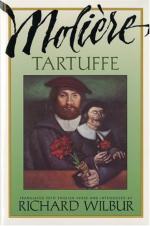|
This section contains 12,035 words (approx. 41 pages at 300 words per page) |

|
SOURCE: "Molière's Tartuffe and the Scandal of Insight," in Subjectivity and Subjugation in Seventeenth-Century Drama and Prose: The Family Romance of French Classicism, Cambridge University Press, 1992, pp. 113-40.
In the following excerpt, Greenberg offers a psychoanalytic explanation for the fearful reaction against Le Tartuffe during the seventeenth-century.
Unquestionably Le Tartuffe is Molière's most scandalous comedy. From its creation at Versailles as part of the royal festivities known as the "Plaisirs de l'Ile Enchantée" in May of 1664 to its withdrawal from the stage and the royal government's refusal to allow its public performance for a period of several years, the play, in its different versions, ignited a debate rarely paralleled in the annals of the French stage. During the period of its prohibition, Molière, his supporters and enemies engaged in heated controversy over the real or imagined attack on piety and "dévots," and over...
|
This section contains 12,035 words (approx. 41 pages at 300 words per page) |

|


